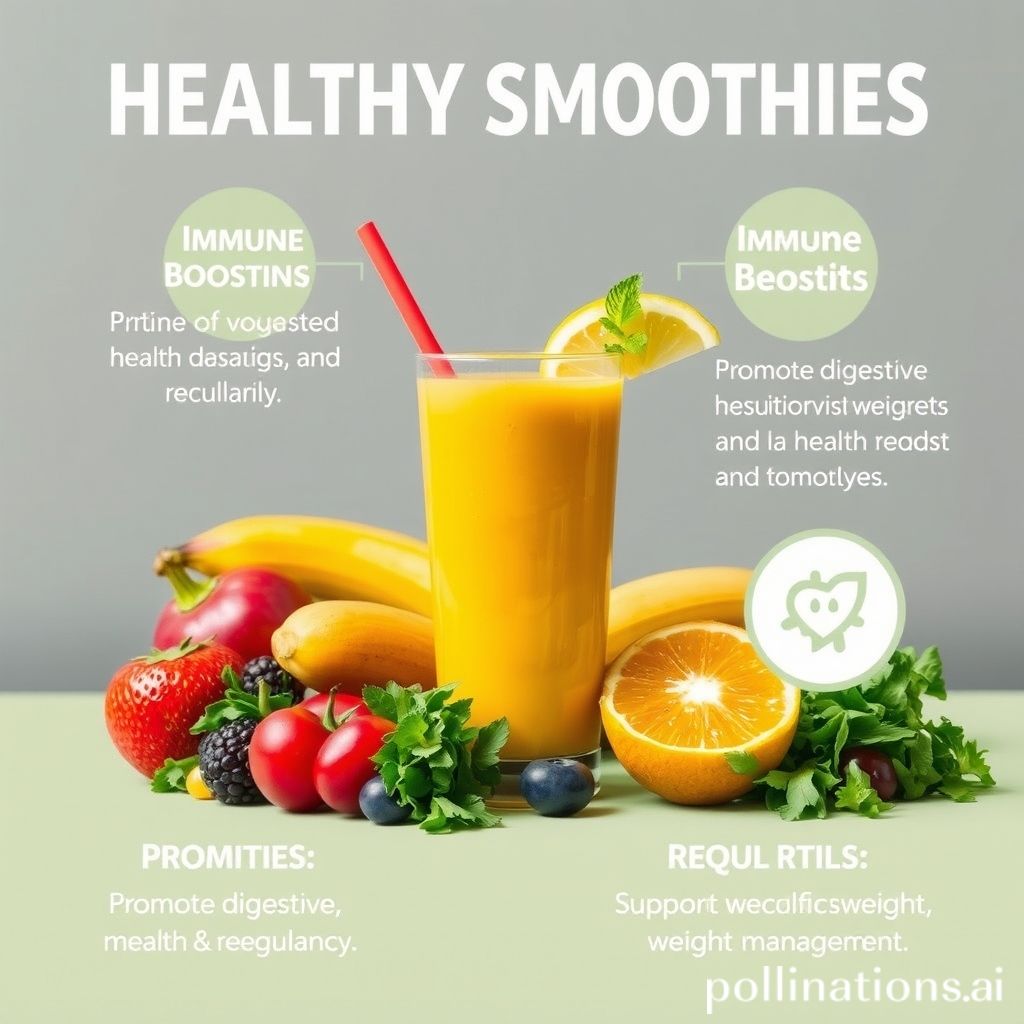Is Smoothie Better Than Juice?
Smoothie or juice: which one holds the key to unlocking optimal health? As we navigate the ever-expanding world of wellness, it’s crucial to understand the nutritional differences between these two popular options. In this comprehensive guide, we’ll explore the unique benefits and drawbacks of both smoothies and juices, empowering you to make an educated choice that aligns with your health goals.
Whether you’re seeking a natural energy boost, a way to support your immune system, or a tool for weight management, this article will equip you with the knowledge you need to make the best decision for your well-being.

Table of Contents
The Nutritional Value of Smoothies
Benefits of Blending Fruits and Vegetables in Smoothies
Smoothies provide a convenient and delicious way to incorporate a variety of fruits and vegetables into your diet. Blending them retains the fiber content, aiding digestion and promoting a healthy gut. Fiber also helps regulate blood sugar levels and keeps you feeling full for longer, making smoothies great for weight management.
Incorporating Healthy Fats and Proteins in Smoothies
To boost the nutritional value of your smoothies, add sources of healthy fats like avocados, nuts, and seeds. These provide essential fatty acids that support heart health and brain function. Including protein-rich ingredients like Greek yogurt, tofu, or protein powder can enhance satiety and support muscle repair and growth.
Potential Drawbacks of Smoothies
While smoothies can be nutritious, it’s important to be mindful of potential drawbacks. Some recipes may contain high amounts of added sugars, which can contribute to weight gain and other health issues. Portioning your smoothies properly is crucial to avoid excess calorie intake. Controlling portion sizes and avoiding overconsumption can be challenging as smoothies are often served in large servings.
To make the most of smoothies, strike a balance. Incorporate a variety of fruits and vegetables, choose ingredients with healthy fats and proteins, and be mindful of portion sizes and added sugars. By doing so, you can enjoy the nutritional benefits of smoothies while maintaining a healthy and balanced diet.
Considering these factors, along with moderation and balance, is key to reaping the full benefits of smoothie consumption. So go ahead, blend up a nutritious and delicious smoothie to fuel your day!
Boost smoothie nutrition with healthy fats, proteins. Watch portion sizes, added sugars. Balance is key for a healthy diet.Nutritional Value of Juices
Advantages of Juicing for Nutrient Absorption
Juicing offers several advantages for nutrient absorption:
- Concentrated Nutrients: Juices provide a concentrated source of essential vitamins and minerals, allowing quick absorption and utilization by the body.
- Easy Digestion: The juicing process breaks down fruits and vegetables into a more easily digestible form, enhancing nutrient absorption efficiency.
- Hydration: Juices are rich in water content, helping to keep you hydrated while delivering essential nutrients.
Potential Loss of Fiber in Juices
While juices offer various nutritional benefits, it is important to note the potential loss of fiber:
- Fiber Reduction: Juicing extracts the liquid from fruits and vegetables, significantly reducing the fiber content compared to consuming whole fruits and vegetables.
- Role of Fiber: Fiber plays a crucial role in promoting healthy digestion, regulating blood sugar levels, and supporting heart health. It is important to incorporate fiber from other sources into your diet.
Focusing on Vitamin and Mineral Content
When considering the nutritional value of juices, it is essential to focus on their vitamin and mineral content:
- Vitamin Boost: Juices can be an excellent source of vitamins, including vitamin C, vitamin A, and various B vitamins, depending on the fruits and vegetables used.
- Mineral Richness: Juices can also provide essential minerals such as potassium, magnesium, and iron, which are vital for various bodily functions.
- Variety Matters: To maximize the nutritional benefits, it is recommended to incorporate a variety of fruits and vegetables into your juices to obtain a broader range of vitamins and minerals.
| Nutritional Benefits of Juices | Considerations |
|---|---|
| Concentrated source of essential vitamins and minerals | Potential loss of fiber |
| Easy digestion and efficient nutrient absorption | Incorporate fiber from other sources |
| Hydration along with nutrient delivery | Focus on vitamin and mineral content |
Understanding the nutritional value of juices allows you to make informed choices to complement your overall diet and ensure a well-balanced intake of essential nutrients.
Health Benefits of Smoothies
Boosting Immune System with Antioxidants
Smoothies are not only delicious but also packed with antioxidants that can help boost your immune system. Antioxidants protect your body against free radicals, harmful molecules that can damage cells and contribute to various health issues. By incorporating antioxidant-rich ingredients like berries, spinach, and kale into your smoothies, you can provide your body with a powerful defense against oxidative stress and strengthen your immune system.
Promoting Digestive Health and Regularity
Smoothies can also be beneficial for your digestive health. Many smoothie ingredients, such as fruits, vegetables, and yogurt, are rich in fiber. Fiber plays a crucial role in promoting regular bowel movements and preventing constipation. Additionally, the natural enzymes present in certain fruits like pineapple and papaya aid in digestion by breaking down proteins and improving nutrient absorption. Including these ingredients in your smoothies can help maintain a healthy digestive system and ensure regularity.
Supporting Weight Management Goals
If you’re looking to manage your weight, smoothies can be a valuable addition to your diet. They can be a satisfying and nutritious meal or snack option that helps you feel full while providing essential nutrients. By including ingredients like protein-rich Greek yogurt, healthy fats from avocado or nut butter, and fiber-filled fruits and vegetables, you can create a well-rounded smoothie that keeps you satiated for longer periods. This can help curb cravings and prevent overeating, ultimately supporting your weight management goals.
Incorporating smoothies into your routine can harness their health benefits, including immune system support, improved digestive health, and assistance in weight management. Consider creating a daily smoothie habit by experimenting with various flavors and ingredient combinations to enjoy these advantages while indulging in a delicious and nutritious treat.

Health Benefits of Juices
Detoxifying and Cleansing Properties
Juices offer a natural and effective way to detoxify and cleanse the body. Packed with antioxidants, vitamins, and minerals, juices provide a powerful boost to the body’s natural detoxification processes. By consuming fresh juices, you can help eliminate toxins and promote a healthier, cleaner system.
Enhancing Hydration Levels
One of the key benefits of juices is their ability to enhance hydration levels. Juices are primarily composed of water, which helps to replenish the body’s fluids and maintain proper hydration. This is especially important during hot summer months or after engaging in physical activities that cause excessive sweating.
Providing a Quick Source of Nutrients
Juices serve as a convenient and quick source of essential nutrients. When you juice fruits and vegetables, you extract their liquid content, which contains a concentrated dose of vitamins, minerals, and antioxidants. This allows your body to quickly absorb and utilize these nutrients, providing an instant boost to your overall health and well-being.
Additional Information in Table Format:
| Information |
|---|
| Detoxifying and cleansing properties: Juices are rich in antioxidants, vitamins, and minerals, which support natural detoxification processes in the body. |
| Enhancing hydration levels: Juices primarily consist of water, helping to replenish fluids and maintain optimal hydration. |
| Providing a quick source of nutrients: Juices contain concentrated amounts of essential nutrients, allowing for rapid absorption and utilization by the body. |
Remember, incorporating a variety of fruits and vegetables into your juices will provide a broader range of nutrients. Enjoying a glass of freshly squeezed juice can be a delicious and effective way to boost your health and well-being.
Drawbacks of Smoothies
1. High Sugar Content in Some Smoothie Recipes
Smoothies are a convenient way to add fruits and vegetables to your diet, but be careful with the ingredients. Some smoothies can have high sugar content, especially if they contain added sweeteners or high-sugar fruits.
Too much sugar can lead to weight gain, increased risk of heart disease, and blood sugar imbalances. Choose ingredients wisely and use low-sugar fruits like berries or more vegetables to reduce sugar intake.
2. Potential for Excess Calorie Intake
While smoothies can be nutritious, they can also be high in calories if not prepared carefully. Ingredients like nut butters, avocado, and full-fat yogurt contribute to the calorie content. Consuming large portions or having high-calorie smoothies frequently can lead to excess calorie intake.
To avoid this, use lower-calorie alternatives like almond milk or coconut water as the base. Use smaller portions of calorie-dense ingredients and balance them with lower-calorie options like leafy greens or citrus fruits.
3. Difficulty in Portion Control
One challenge with smoothies is losing track of portion sizes. Unlike whole fruits or vegetables, it’s easy to consume larger quantities of blended food without realizing it.
To overcome this, measure the ingredients and track the calorie content of your smoothies. Using measuring cups or a kitchen scale can help ensure appropriate portion sizes. Adding fiber-rich ingredients like chia seeds or flaxseeds can also increase feelings of fullness and aid in portion control.
Being aware of these drawbacks can help you make informed choices when including smoothies in your diet. Choose low-sugar ingredients, be mindful of calorie intake, and practice portion control to enjoy the benefits of smoothies while minimizing the drawbacks.
Conclusion
In conclusion, both smoothies and juices offer unique nutritional benefits that can support a balanced diet. Smoothies are ideal for boosting the immune system, aiding digestion, and managing weight. On the other hand, juices are great for detoxification, hydration, and quickly obtaining nutrients.
However, it’s important to be aware of the potential downsides, such as high sugar content in smoothies and the loss of fiber in juices. Ultimately, the choice between smoothies and juices should be based on individual health goals, preferences, and guidance from healthcare professionals.
Faq about Is Smoothie Better Than Juice?
FAQ 1: Can smoothies replace a meal?
Yes, smoothies can be a convenient and nutritious meal replacement option. They provide a good balance of macronutrients, vitamins, and minerals. Just make sure to include enough protein, healthy fats, and fiber to make it a complete meal replacement.
FAQ 2: Are juices a good option for weight loss?
While juices can be part of a weight loss plan, it’s important to consider their calorie content and practice portion control. They do provide essential nutrients and hydration, but they can also be high in sugars and lack fiber, which may affect satiety.
FAQ 3: Can smoothies and juices be part of a balanced diet?
Certainly! Smoothies and juices can be incorporated into a balanced diet as long as they are consumed in moderation alongside a variety of other whole foods. Remember to include a range of fruits, vegetables, and other food groups for nutrient diversity.
FAQ 4: Are there any specific health conditions that favor smoothies or juices?
Smoothies and juices can be beneficial for certain health conditions such as diabetes, digestive disorders, and nutrient deficiencies. However, it’s crucial to consider individual needs and consult with healthcare professionals to determine the suitability and any necessary modifications.
FAQ 5: Which option is better for overall health: smoothies or juices?
The choice between smoothies and juices depends on individual health goals and preferences. Smoothies retain fiber, while juices provide a concentrated source of nutrients. Consider personal preferences, dietary needs, and enjoyment when deciding which option is better for overall health.

